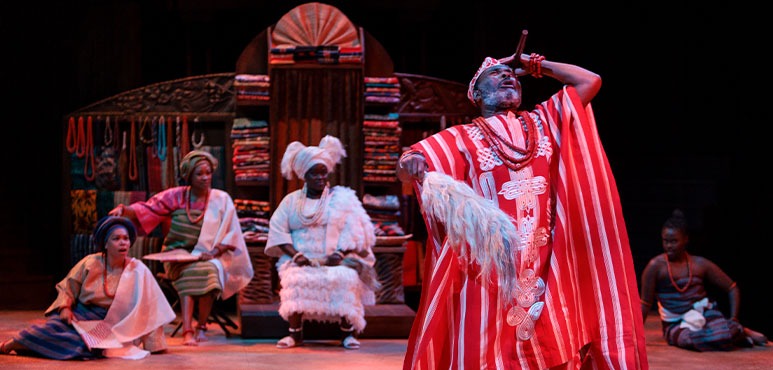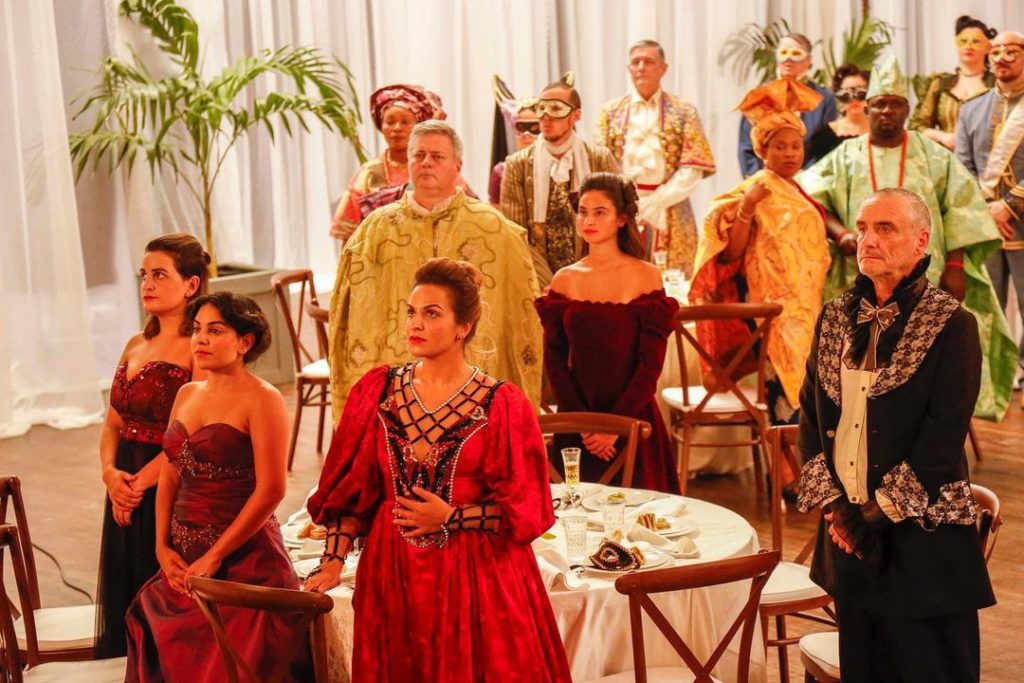In the Old Oyo Kingdom, 30 days after the death of the King and as his body waits to be buried, the King’s Horseman must commit ritual suicide in order to see off the King’s spirit into the ancestral world. The chieftain who is addicted to the merriment that comes with his office, parties away “the life of his head” on the set day of his departure from earth. He gets swayed by the beauty of a virgin girl set to wed her groom and plugs his heart to pleasure his hoe with a virgin land before he performs his destined duty to this land and race one last time. However, his lustful desires set him up for doom and a confrontation with the British District Officer who would stop at nothing to prevent the activation of the people’s culture and tradition, not minding the devastating consequences.

Ebony Life Production’s new release Elesin Oba is an “adaptation” of Nobel Laurette Wole Soyinka’s 1975 play, “Death and the King’s Horseman”, which is also an adaptation of Duro Ladipo’s 1946 play, “Oba Waja” Both are based on real events. According to the Merriam-Webster’s English Dictionary, adaptation is “specifically a composition rewritten into a new form…changing circumstances…modification of an organism or its parts that makes it more fit for existence under the conditions of its (new) environment”. Play is an art medium; cinema is another with its own rules and method of execution. It is important to state from this introduction that this review is absolutely focused on the movie “adaptation” and its efforts and will not digress at no point to the original source, except when making references where necessary. Written and directed by the late Biyi Bandele, the movie stars and features Odunlade Adekola, Bello Shaffy, Omowunmi Dada, Deyemi Okanlawon, Jide Kosoko, Olawale ‘Brymo’ Olofooro, Mark Elderkin, Langley Kirkwood, Joke Silva, Taiwo Ajai-Lycett and executively produced by Mo Abudu.
The spine of this story is Elesin Oba’s ‘divine-purposed’ duty to his family, community, and race – to carry out a ritual suicide so as to escort the dead king to the ancestral realm of the spirit world, just as his ancestors have done in time past. This is made known in the expository conversation between himself and Olohun Iyo at the market – “My mind is made up and nothing will stop me from going to the afterlife tonight”. Meanwhile, the District Officer representing the white race or the western world finds this cultural practice barbaric and a criminal offense under the British law governing the Oyo Kingdom at this time. So, the film story does not change any letter from the CDP of the stage play it tries to adapt from. News flash: this is not the only element that does not change.

Elesin Oba – The King’s Horseman’s plot is almost a literary copy and paste from the source material. It almost feels like a documentary. A strong-willed Elesin Oba interpreted as the king Horseman (Odunlade Adekola), one of the most honourable and celebrated chiefs in the community is set to perform a ritual sacrifice that involves him killing himself to complete the burial rite of the king who had died 30 days ago. This is important to preserve the spirit of harmony in his community. He is so strong-willed that he disowns his own son for abandoning his village for the white man’s ‘visa lottery’. His strong will also pushes him into the loins of a virgin bride (Omowunmi Dada) despite being told she is already at the entrance of her husband-to-be. Elesin Oba who has an insatiable appetite for pleasure and women begins his last day on earth partying among tons of women and young ladies, some of them stark naked, eating the life of his head. As he steps into the market, he is accompanied and greeted with drums and songs, wine and splendor, pride and honour. Everyone is aware of his ceremonial fate and duty, even the children. Well, except the district officer, Simon, and his wife, Jane who are immediately informed by the Native Administration Police Officer, Amusa (Kide Kosoko) that “a prominent chief is to commit a death tonight as a result of native custom”. Simon who would not allow any spiritual ritual of the “savages” to get in his way of impressing the prince with his masquerade costumes at the ball, sends a notice to Amusa to get Elesin Oba arrested not minding the potential riot. He does not really care if the people poison themselves or throw themselves off some cliff in the name of “some barbaric custom”.
Meanwhile, Olunde (Deyemi Okanlawon), Elesin Oba’s first and only son who had been sponsored by The Pilkings on a medical education adventure in Britain, sneaks into the community with the sole purpose of burying his father and taking over his spiritual position as the next Elesin Oba to the next king. This shocks The Pilkings who thought their mentee should have been purged of all of his cultural and traditional beliefs and values.
After Elesin Oba satisfactorily fills his sexual lust with the blood of the virgin bride and then the king’s pet dog is slaughtered at Ogun’s shrine, he steps out to perform his self-sacrificial rite only to be greeted by the chains of the white man’s policemen.
“…your greatest art is the art of survival. But at least, have the humility to let others survive in their own way”. I am not sure the screenplay of Elesin Oba – The King’s Horseman is written to ‘survive’ in its own way. You cannot create an adaptation from any source material without really adapting it to fit into the cinematic medium.
One must applaud the screenwriter for choosing to convey the dialogue in Yoruba as you cannot truly tell the original story of a people without doing it in their own language. Although, those in the know reveal this idea was solely to target Oscar nomination eligibility. Why not? But that is about the only element the screenplay gains partial independence from. Biyi Bandele, with this screenplay, was too afraid to leave the shadows of Wole Soyinka the writer of the source material because the whole screenwriting feels so much like playwriting. As I stated in my intro, this is solely a review of the movie and not its source material.

So, from the first page, the screenplay sets up Elesin Oba as a pleasure-hungry chief who enjoys basking in the sea of women, parties, and public adulations. We soon realise while he so much wants to choke himself with variants of this pleasure on this day. It is the very day he has lived his whole life for – the very purpose of his office as The King’s Horseman. He must perform the ritual suicide to prevent the spirit of the king from roaming around the spirit world and the kingdom from racial doom. This duty is a noble one as we see the whole community greet him with the utmost respect as they celebrate his last day on earth. So, now that the screenplay has succeeded in establishing the main character, his problem (need), goal, and mission, can we move on? No! We are stuck with repetitive fillers that are very tiring to sit through.
Finally, without an inciting incident, we finally cross what looks like a threshold (from a familiar environment or situation into an unfamiliar one) into the supposed second act when Elesin Oba is arrested, chained, and thrown in the cell by Simon. He struggles to adapt and react to his new reality, confronting the District Officer. 90% of this screenplay is just expository dialogue, too wordy and not worthy of the cinema.
Meanwhile, the conflict is between Elesin representing the Yoruba custom, and Simon, standing in for the western culture. The white man, with his savior complex set up to save the ‘lesser race’ from their “barbaric” cultures and customs.

The characterization of this movie is inherited from its source material. The major characters are representations of people, customs, and philosophical beliefs. Elesin Oba who represents the Yoruba race (if you like, the African identity), their custom, and culture, has a duty to keep up the spiritual cycle of the three worlds – the living, the dead, and the unborn. The District Officer stands in for the culture of the colonial masters who see their ways of life as superior to the blacks in every sense. They find the African culture and customs barbaric while they celebrate aspects of theirs that share the same ideologies. While Elesin Oba lets his personal desires get in the way of his duty to his people, the white man does not care if he kills many people to prevent one man from performing a ‘ceremonial suicide’ (illegal according to the British law) as that is his own duty to the Queen.
Odunlade Adekola who plays Elesin Oba and Shaffy Bello who plays Iyaloja shine in this work, despite a total lack of dimension in their characters. Other characters and the actors appear like caricatures.
Many have also said that the cinematography of this piece should be applauded for its clear pictures, functional and expository shots, and angling.
Compared to his past works, this is a low score for the late Biyi Bandele’s directorial prowess as the blocking and staging feel like one is sitting through a stage play on screen. Maybe he would have been to explain the experiment he was carrying out with this execution. The actors are poorly blocked in a way that makes them appear like they are trying not to back the stage. You can almost bet, they brought a stage to the location, mounted the camera, pressed record, and told the actors to start acting the script.
However, the production design of this movie is a beauty to behold the venue of the British ball reminds me of “Grand Budapest Hotel”. The makeup of Elesin Oba’s beard is however a misfortune, a sad distraction from the reality of the character. That makeup is a disaster.
The music score by Brymo is also so satisfying to the soul of the story. Meanwhile, maybe a different director will convince me Brymo can act, for now, he should be banned from any movie set.
One clear message from Elesin Oba – The King’s Horseman is, how lustful desires can distract one man from his duty and destiny while, another man, despite having his own desires is obsessed with fulfilling his mandated duty to his race.
Another strong message this story also plays out well is the cultural and racial dynamics and how our sentimental understanding or lack of it can create tragic complexities.



